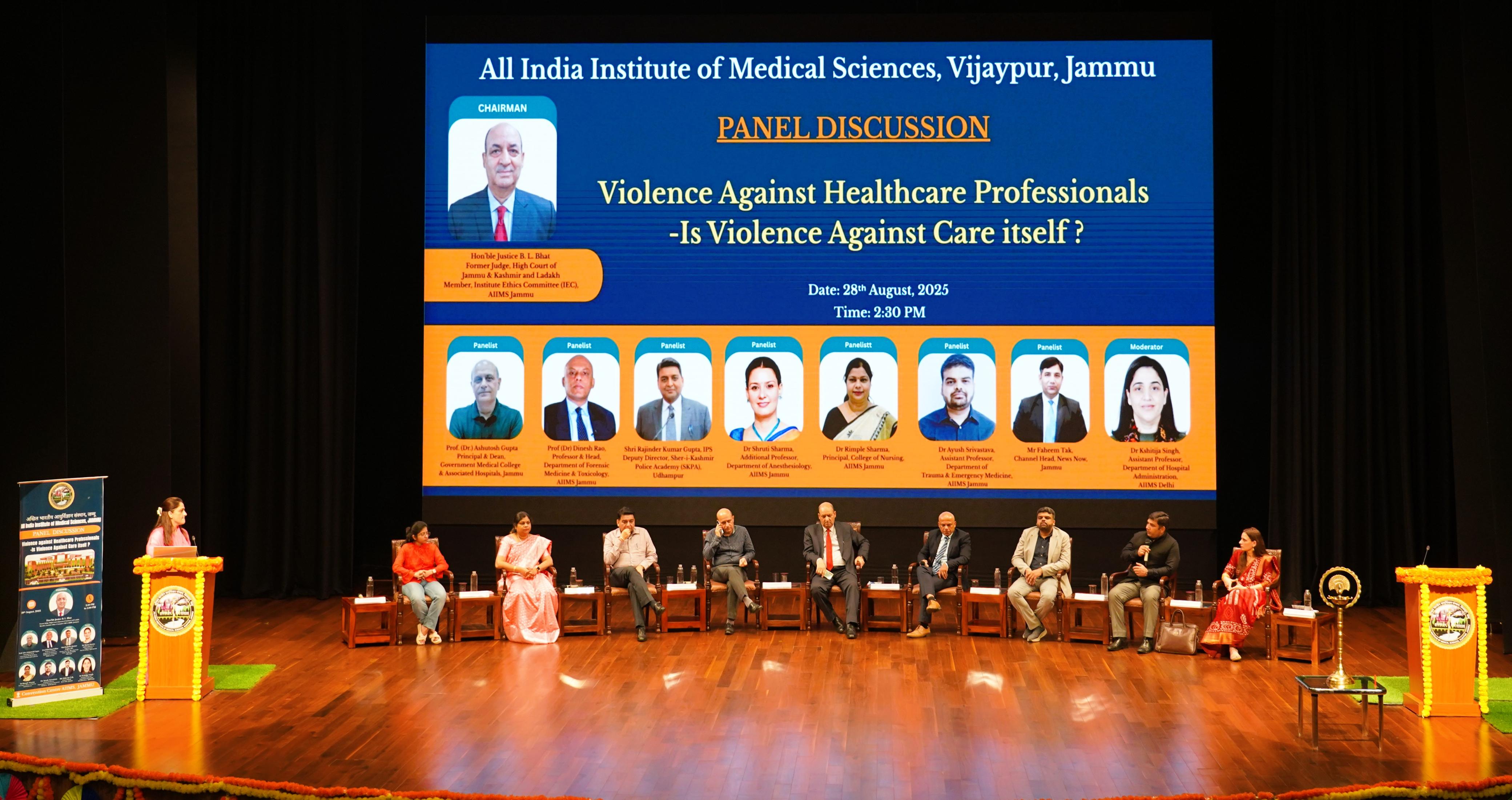
early times report
Jammu, Sept 1: AIIMS Jammu organized a high-level Panel Discussion on “Violence against Healthcare Professionals”, bringing together experts from the judiciary, police, medical academia, nursing community, and media to deliberate on one of the most pressing issues confronting healthcare today—the safety and confidence of doctors and caregivers. The event, held at the AIIMS Jammu Convention Centre, highlighted not only the magnitude of the problem but also charted pathways for solutions at legal, institutional, and community levels.
The session was chaired by Hon’ble Justice B. L. Bhat (Retd.), Justice J&K & Ladakh High Court and Member, Institute Ethics Committee, AIIMS Jammu. Distinguished panelists included Prof. (Dr.) Ashutosh Gupta, Principal & Dean, GMC & Associated Hospitals Jammu; Prof. (Dr.) Dinesh Rao, HoD, Forensic Medicine & Toxicology, AIIMS Jammu; Shri Rajinder Kumar Gupta, IPS, Deputy Director, SKPA Udhampur; Dr. Shruti Sharma, Additional Professor, Dept. of Anesthesiology, AIIMS Jammu; Dr. Rimple Sharma, Principal, College of Nursing, AIIMS Jammu; Dr. Ayush Srivastava, Assistant Professor, Trauma & Emergency Medicine, AIIMS Jammu; Mr. Faheem Tak, Channel Head, News Now Jammu; and Dr. Kshitija Singh, Assistant Professor, Hospital Administration, AIIMS New Delhi, who moderated the session.
“Violence against healthcare professionals is not merely an attack on individuals, but an assault on the very spirit of care and compassion that defines medical practice. As AIIMS Jammu expands its services, we remain committed to ensuring not only quality care for patients but also dignity and protection for our healthcare teams.”
During the discussion, the moderator, Dr. Kshitija Singh, set the stage by presenting the magnitude of the problem, its root causes, and the psychological and professional consequences on doctors and nurses.
• Justice B. L. Bhat (Retd.) called for the enactment of a comprehensive central law, better patient–doctor communication, and the installation of CCTV cameras in hospitals as deterrents.
• Prof. (Dr.) Ashutosh Gupta, Principal GMC Jammu, emphasized that “laws will continue to be framed, but the real change must begin at the ground level—through stronger systems, better counselling of patients’ families, and preventive mechanisms in hospitals.”
• Shri Rajinder Kumar Gupta, IPS, expressed that though the system is willing to protect doctors and bring perpetrators to task but many cases collapse midway as doctors often withdraw complaints: “FIRs are registered, but doctors do not pursue cases to the end. Unless accountability continues till trial, deterrence will remain weak.”
• Prof. (Dr.) Dinesh Rao stressed the role of medical ethics in preventing conflict and underscored the responsibility of doctors in upholding transparency and trust in care delivery. He emphasized the vital role of institutions in providing support and handling the matters in order to provide safe environment to its doctors
• Dr. Shruti Sharma based on her experience in critical care emphasized the importance of timely brief of patient status and empathetic communication in handling such sensitive situation. She also stressed upon the psychological toll of such violence, especially on young residents
• Dr. Rimple Sharma shared the importance of incorporation of training nursing students and medical graduates in soft skill communication and clinical psychology to handle diverse patients.
• Dr. Ayush Srivastava pointed out the heightened risk in emergency and trauma settings, where emotions run high and healthcare providers are most vulnerable.
• Representing the media, Mr. Faheem Tak remarked: “Media is of two kinds—ethical media, which reports responsibly, and citizen-driven media, which often goes live without facts or context. Irresponsible reporting can escalate tensions, whereas responsible media can build trust and act as a bridge between doctors and society.”
A deeply human perspective came from Dr. Ruchika Agarwal, PG student from GMC Jammu, who recently faced an incident of violence while on duty. Her testimony brought home the lived reality of young doctors and reinforced the urgent need for institutional safeguards and a plea to society to be understanding and supportive towards doctors who are working tirelessly.
Dr. Kshitija, moderator of the session at the end presented the recommendations of the panel. The institutions and society need to together bring changes to reestablish the trust and respect which was once the foundation of Indian medical care.
The event witnessed enthusiastic participation from Faculty, Residents, Nursing Officers, Administrative Staff, Students, Media and Civil SSociety. The dialogue generated actionable recommendations—ranging from legal reforms to community sensitization and hospital-level measures—aimed at ensuring safer healthcare environments.
AIIMS Jammu reaffirmed its commitment to leading this movement, emphasizing that protecting those who heal is essential to protecting public health itself.
|
